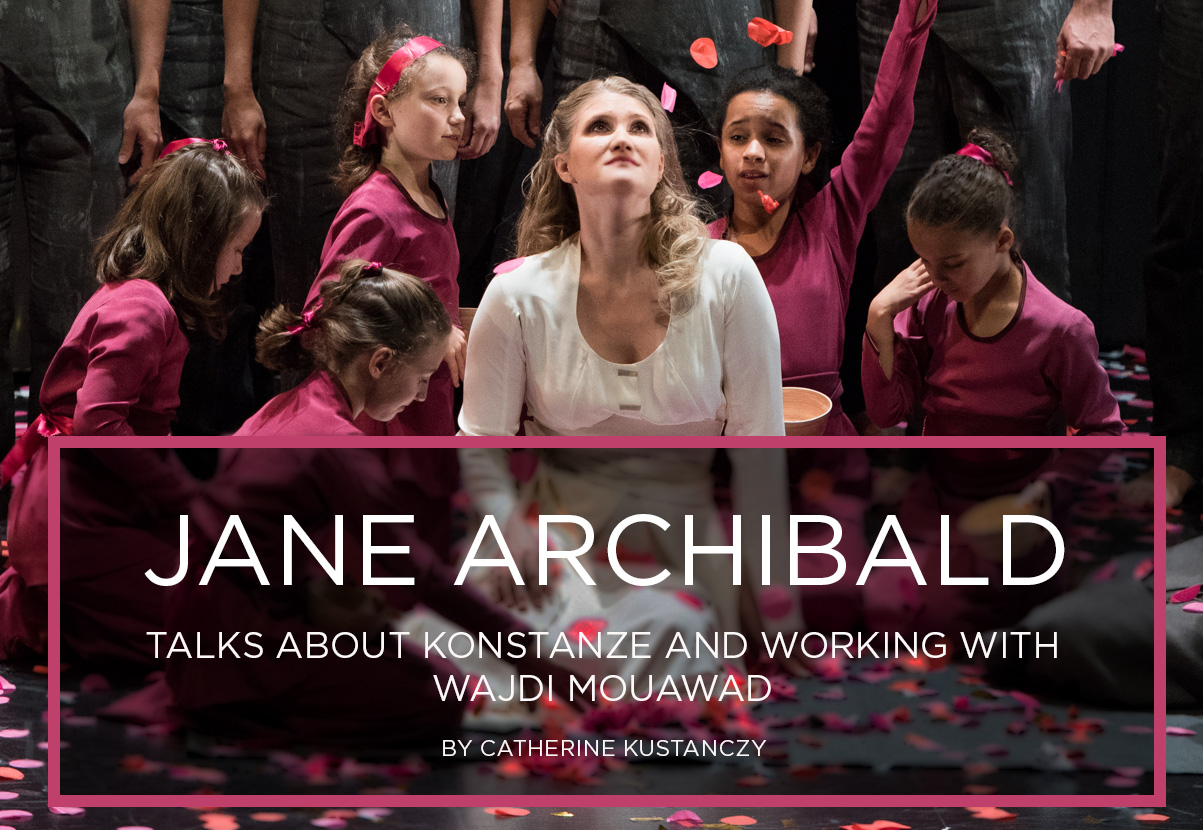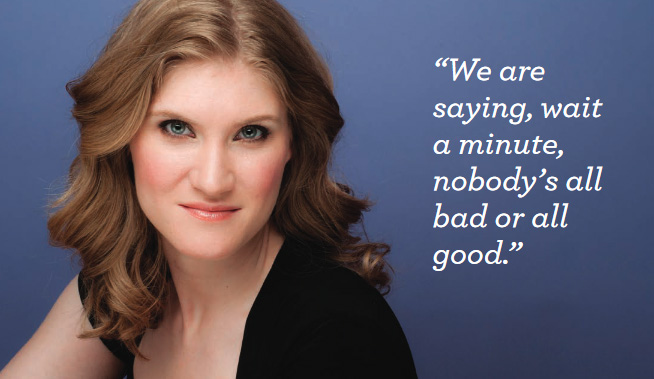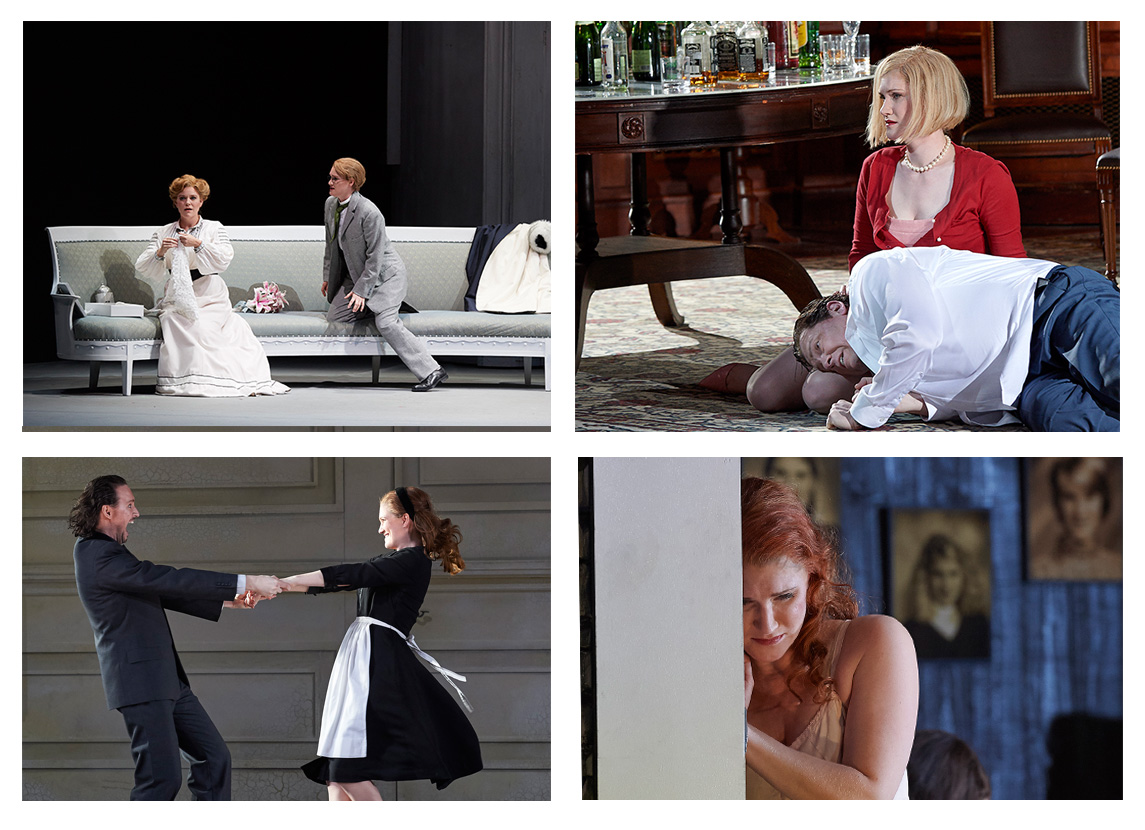-
In Discussion with Jane Archibald
By CATHERINE KUSTANCZYPosted in COC

Jane Archibald was initially nervous about performing in Wajdi Mouawad’s production of The Abduction From The Seraglio (Die Entführung aus dem Serail) during its first staging at Opéra de Lyon in 2016. Theatre directors, while meaning well, can often make demands on singers that aren’t technically feasible, and with no experience in opera, approach productions with what she calls “a great many opinions” on revolutionizing the art form. Working with the Lebanese-Canadian theatre artist, however, she experienced an open exchange of ideas and respect for music.
At the start of production, Archibald says the director “sent out a wonderful long introductory letter, with an almost-essay on his feelings about the piece and what he wanted to do. He had really thought about it—it wasn’t, “opera is easy; I’ll throw it together!” It was, “I’ve thought about this; this is what I think about the women and characters and their development.” That was automatically a lot more interesting.”

Mozart’s 1782 opera, which revolves around the hero Belmonte (Mauro Peter) rescuing his love Konstanze (Archibald) from the seraglio of Bassa Selim (Raphael Weinstock), with help from his servant Pedrillo (Owen McCausland). The work went through several re-writes in its original iteration, with the initial libretto by Christoph Friedrich Bretzner adjusted and adapted by Gottlieb Stephanie; Stephanie, whom Mozart had lobbied for an opera commission, was the inspector of the Nationalsingspiel, a company set up by Austrian Emperor Joseph II to promote German language works. Mozart, together with Stephanie, made changes to Bretzner’s original libretto, ones that the composer felt greatly aided the work’s musical and theatrical impacts.
The work features a Eurocentric orientalism that presents challenges for 21st-century audiences and artists. When asked about a work considered to be firmly rooted in its time, Archibald is quick to respond. “Are there many operas that aren’t? They are all a product of their time but it’s more overt (in Seraglio). Wajdi addresses it head on.”
Mouawad added his own original dialogue into the work in French; it was translated into German by dramaturge and translator Uli Menke. “The text is complex and full of layers,” Archibald notes, “but we come off thinking in a higher way. Things are not black and white.”This Seraglio is notable, the soprano says, for the opportunity it presents for conversation. “We are saying, wait a minute, nobody’s all bad or all good.” She adds that Mouawad approached Seraglio “very much through a feminist lens.” The character of Konstanze, usually presented as simpering, is here allowed to be what Archibald terms “an actual human being. When I get to speak that kind of text and have that exchange (with Belmonte) onstage, my arias are different—we understand the emotion behind them in a deeper way.”
Mouawad’s Konstanze holds more nuanced views, ones Archibald has clearly thought a good deal about, having performed in the original production in Lyon. “For Konstanze, it’s a case of, ‘I can’t hate these people; I’ve lived with them in captivity. I don’t want to play this racist game; I’ve changed and I can’t be the same person I was before I was taken. Love me for me. If we are to have any hope of resuming this relationship, you can’t say, okay, go back to being a vapid, noble young woman who is going to enter society and continue with shallow ways—I’ve had this experience, and it’s changed me.’ It’s nice to have a chance to play her in this way and not just, ‘oh, woe is me!’ It elevates the story and makes the rest of it worthy of Mozart’s music.”
Jane Archibald's many roles in the last few years performing with the COC - clockwise: As Zdenka in Arabella (2017), Donna Anna in Don Giovanni (2015), Ginevra in Ariodante (2016) and as Susanna in The Marriage of Figaro (2016).
While known for performing the roles of both Konstanze (in Seraglio) and the Queen Of The Night (in The Magic Flute), Archibald, who is the Canadian Opera Company’s first Artist-in-Residence (for the 2017/2018 season), has expanded her repertoire and performs Donna Anna (from Don Giovanni) and Susanna (from The Marriage Of Figaro), and looks forward to doing more bel canto roles, as well as being back on stage in Toronto regularly. Having performed the role of Ginevra last season in Handel’s Ariodante, she was on the stage of the Four Seasons Centre this past fall, as Zdenka in Strauss’ Arabella. In the spring, she’ll be the titular Nightingale in the COC revival of Stravinsky’s The Nightingale And Other Short Fables.
“It’s sort of a long-term goal,” Archibald says of performing the great works. “All the bel canto repertoire requires coloratura facility. I’ve done Lucia and Sonnambula, so you know, everything comes incrementally and slowly, and that’s all right.”
Catherine Kustanczy is a freelance arts journalist with a speciality in classical coverage, and has had work published in The Toronto Star, The National Post, Opera News and Opera Canada magazines.The celebrated director Wajdi Mouawad is a graduate of the National Theatre School of Canada, and is known for politically charged themes throughout his plays, novels and directorial endeavors. His work brims with ideas around loss, betrayal, and struggle. In 2000, Mouawad received the Governor General’s Award for Literature in Drama, and in 2009, was made an Officer of the Order of Canada. His award-winning 2003 work Incendies (Scorched) has been produced around the world, with the subsequent film version, directed by Denis Villeneuve, being Canada’s official selection for the 2011 Academy Awards.Photo credits: Banner - Jane Archibald in The Abduction from the Seraglio (Opéra de Lyon, 2016), Photo: Bertrand Stofleth; Production images, clockwise - (l-r) Erin Wall and Jane Archibald in Arabella (COC, 2017); Jane Archibald and Michael Schade in Don Giovanni (COC 2015); Jane Archibald in Ariodante (COC, 2016); (l-r) Josef Wagner and Jane Archibald in The Marriage of Figaro (COC 2016), all photos: Michael Cooper.
